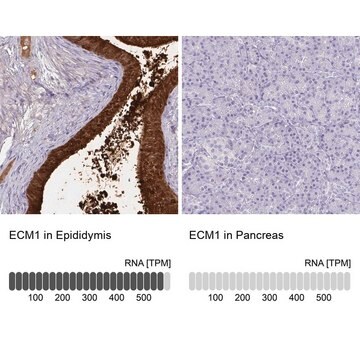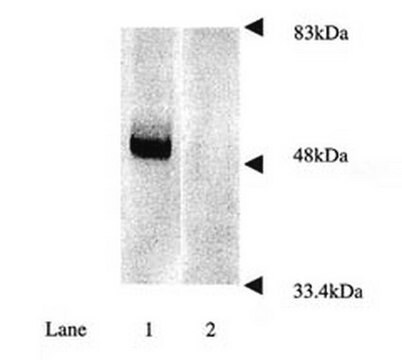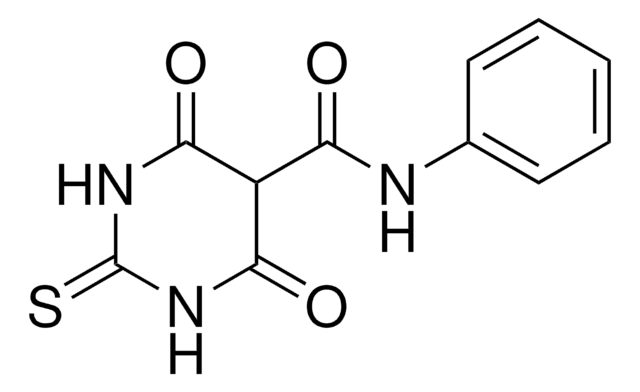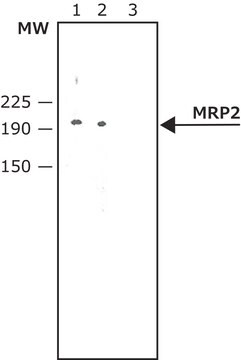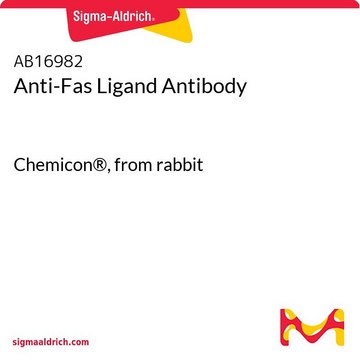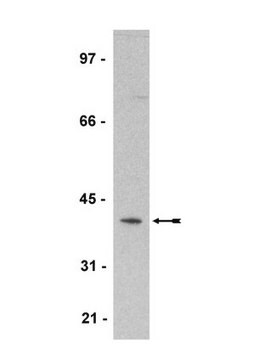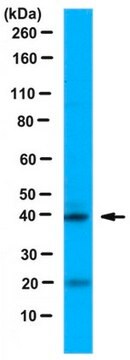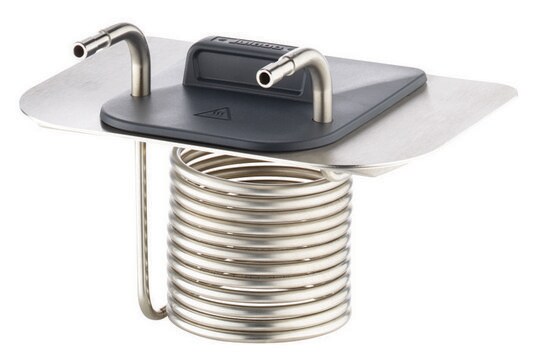AB5519
Anti-Prodynorphin Antibody
Chemicon®, from guinea pig
Sign Into View Organizational & Contract Pricing
All Photos(1)
About This Item
UNSPSC Code:
12352203
eCl@ss:
32160702
NACRES:
NA.41
Recommended Products
biological source
guinea pig
Quality Level
antibody form
affinity isolated antibody
antibody product type
primary antibodies
clone
polyclonal
purified by
affinity chromatography
species reactivity
rat
manufacturer/tradename
Chemicon®
technique(s)
immunohistochemistry: suitable
NCBI accession no.
UniProt accession no.
shipped in
dry ice
target post-translational modification
unmodified
Gene Information
human ... PDYN(5173)
Specificity
ProDynorphin, rat.
Immunogen
Synthetic peptide from rat ProDynorphin.
Application
Anti-Prodynorphin Antibody is an antibody against Prodynorphin for use in IH.
Immunohistochemistry: 1:500
Optimal working dilutions must be determined by the end user.
APPLICATION NOTES FOR AB5519
IMMUNOHISTOCHEMISTRY
Perfusion: 1) Ca2+-free Tyrode′s solution followed by 2) paraformaldehyde-picric acid fixative and 3) 10% sucrose in PBS as a cryo-protectant. Tissues were rapidly dissected out and stored overnight in 0.1 M phosphate buffer (pH 7.4) containing 10% sucrose.
Slide-mounted tissue sections were incubated with blocking buffer for 1 hour at room temperature. Primary antibody was diluted in blocking buffer to the appropriate working dilution. Blocking buffer was removed and the slides were then incubated at 2-8°C for 18-24 hours with AB5519. After rinsing in PBS 3 times sections were incubated for 60 minutes at room temperature with Cy3-conjugated secondary antibodies. After mounting in a mixture of PBS and glycerol (1:3) containing 0.1% p-phenylenediamine, sections were examined with a Nikon Microphot-SA epifluorescence microscope.
Optimal working dilutions must be determined by the end user.
APPLICATION NOTES FOR AB5519
IMMUNOHISTOCHEMISTRY
Perfusion: 1) Ca2+-free Tyrode′s solution followed by 2) paraformaldehyde-picric acid fixative and 3) 10% sucrose in PBS as a cryo-protectant. Tissues were rapidly dissected out and stored overnight in 0.1 M phosphate buffer (pH 7.4) containing 10% sucrose.
Slide-mounted tissue sections were incubated with blocking buffer for 1 hour at room temperature. Primary antibody was diluted in blocking buffer to the appropriate working dilution. Blocking buffer was removed and the slides were then incubated at 2-8°C for 18-24 hours with AB5519. After rinsing in PBS 3 times sections were incubated for 60 minutes at room temperature with Cy3-conjugated secondary antibodies. After mounting in a mixture of PBS and glycerol (1:3) containing 0.1% p-phenylenediamine, sections were examined with a Nikon Microphot-SA epifluorescence microscope.
Physical form
Affinity purified Guinea pig antibody in PBS containing 0.05% sodium azide.
Legal Information
CHEMICON is a registered trademark of Merck KGaA, Darmstadt, Germany
Not finding the right product?
Try our Product Selector Tool.
Storage Class
10 - Combustible liquids
wgk_germany
WGK 2
flash_point_f
Not applicable
flash_point_c
Not applicable
Certificates of Analysis (COA)
Search for Certificates of Analysis (COA) by entering the products Lot/Batch Number. Lot and Batch Numbers can be found on a product’s label following the words ‘Lot’ or ‘Batch’.
Already Own This Product?
Find documentation for the products that you have recently purchased in the Document Library.
Prostaglandin E2 acts on EP1 receptor and amplifies both dopamine D1 and D2 receptor signaling in the striatum.
Kitaoka, S; Furuyashiki, T; Nishi, A; Shuto, T; Koyasu, S; Matsuoka, T; Miyasaka et al.
The Journal of Neuroscience null
Repeated exposure to the ?-opioid receptor agonist salvinorin A modulates extracellular signal-regulated kinase and reward sensitivity.
David N Potter,Diane Damez-Werno,William A Carlezon,Bruce M Cohen,Elena H Chartoff
Biological Psychiatry null
The kappa-opioid receptor is primarily postsynaptic: combined immunohistochemical localization of the receptor and endogenous opioids.
Arvidsson, U, et al.
Proceedings of the National Academy of Sciences of the USA, 92, 5062-5066 (1995)
Anastasia Brodovskaya et al.
Brain : a journal of neurology, 144(7), 2074-2091 (2021-03-18)
There are no detailed descriptions of neuronal circuit active during frontal lobe motor seizures. Using activity reporter mice, local field potential recordings, tissue clearing, viral tracing, and super-resolution microscopy, we found neuronal activation after focal motor to bilateral tonic-clonic seizures
Our team of scientists has experience in all areas of research including Life Science, Material Science, Chemical Synthesis, Chromatography, Analytical and many others.
Contact Technical Service
